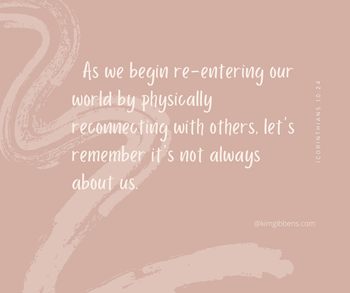 “All things are lawful”, but not all things are helpful. “All things are lawful,” but not all things build up. Let no one seek his own good, but the good of his neighbor. I Corinthians 10:23-24 As we begin to transition from staying at home, social distancing and mask wearing to going out with friends, eating at restaurants and attending indoor events, we need to take a minute and think about what that looks and feels like: not just for us, but for our friends as well. This past year has brought many changes to life as we normally live it. For many of us staying close to home with less human interaction has been a sweet respite for our introverted souls. For others, being isolated from humans left our extroverted personalities revved up like quarter horses waiting for the starting gate to open. Besides these two personality traits, some of us struggle with anxiety, OCD, or even depression. I don’t know about you, but for me navigating the nuances of a new world is a little nerve-racking. I want to be with my friends. I want to go out to eat with them or to get coffee, but not all of my friends are ready for unrestricted life. Not everyone is vaccinated: not everyone can be nor wants to be. Not everyone is free of health concerns for themselves or family members. Not everyone is ready to embrace being indoors in the crowded pool of humanity. And all of us are a little rusty with our social skills. In I Corinthians 10:23-24, I see the perfect guidelines for navigating relationships where not everyone is on the same emotional, social, intellectual, or physical page. Twice Paul states that “All things are lawful.” In other words, post-COVID I am free to do the things as long as it is not against the law or state health guidelines. I can go out to eat in a restaurant, I can go without a mask in public (at least we can here in Florida), and being fully vaccinated I can hug my friends. Before we get too excited about the freedom we are given, Paul balances his “you are free to do anything” with a “but” statement. Simply put, just because I can, doesn’t mean I should. Let’s take a closer look. Each time Paul states that it is okay to do something, he follows it up with an only if statement. The only if statements provide us with the guidelines we need for navigating our interactions with the humans in our life. Luckily, there are only two: Is it helpful and does it build people up? It’s often easy to get tangled up in the “should I do something” when all I really need to do is ask myself: is what I am doing helpful to those around me and does it build them up? If I am asserting my right to do something at the expense of someone else’s well-being, I need to rethink my assertion. If my words and actions guilt my friends into moving at a re-entry speed faster than they are ready, I need to slow down. If time together leaves us feeling more burdened than before we got together, then I need to re-think how I interact with my friends. As we begin re-entering our world by reconnecting physically with our friends, let’s remember it’s not about us. Paul caps his “it is okay to, but” statements with these final words: “Let no one seek his own good, but the good of his neighbor.” I am learning the easiest way to do this is to ask. Before gathering with friends, ask them what they are comfortable doing. Then do what the least comfortable person is comfortable with at the time. It may mean getting coffee and sitting outside at a park instead of going inside the coffee shop. I don’t know about you, but I would rather have an intentional moment of awkwardness than unintentionally wound a friend because I was doing what was right for me and not for them.
4 Comments
|
AuthorBetween a husband, 2 sons, and teaching high school my sanity is found in running and Starbucks. I have a circle of running friends who inspire me to be authentic and real as I live a life of faith before them. Archives
April 2024
Categories |
 RSS Feed
RSS Feed